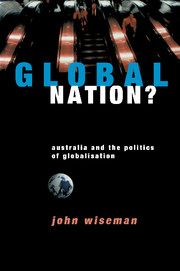Book contents
- Frontmatter
- Contents
- Abbreviations
- Acknowledgments
- 1 Introduction: Australia and the Politics of Globalisation
- 2 Breaking the Spell? Understanding Globalisation
- 3 Transforming the Global Economy? Trade, Capital and Power in the Late Twentieth Century
- 4 Onto the Global Racetrack? Globalising the Australian Economy
- 5 The Price of Competitiveness? The Social Impact of Globalisation on Australia
- 6 Wired to the World? Australia and the Globalisation of Media and Information Technologies
- 7 Nowhere to Hide? Australia in the Global Environment
- 8 Where in the World? Transforming Australian Political Relationships and National Identities
- 9 Alternative Strategies? Thinking and Acting Globally and Regionally
- 10 Alternative Directions? Thinking and Acting Locally and Nationally
- 11 Conclusion
- Notes
- Bibliography
- Index
3 - Transforming the Global Economy? Trade, Capital and Power in the Late Twentieth Century
Published online by Cambridge University Press: 20 May 2010
- Frontmatter
- Contents
- Abbreviations
- Acknowledgments
- 1 Introduction: Australia and the Politics of Globalisation
- 2 Breaking the Spell? Understanding Globalisation
- 3 Transforming the Global Economy? Trade, Capital and Power in the Late Twentieth Century
- 4 Onto the Global Racetrack? Globalising the Australian Economy
- 5 The Price of Competitiveness? The Social Impact of Globalisation on Australia
- 6 Wired to the World? Australia and the Globalisation of Media and Information Technologies
- 7 Nowhere to Hide? Australia in the Global Environment
- 8 Where in the World? Transforming Australian Political Relationships and National Identities
- 9 Alternative Strategies? Thinking and Acting Globally and Regionally
- 10 Alternative Directions? Thinking and Acting Locally and Nationally
- 11 Conclusion
- Notes
- Bibliography
- Index
Summary
At every level, from the personal to the team, corporate, enterprise and far flung joint venture, and in every corner of the globe, the new economic order is opening worlds of opportunity by battering down the old barriers and boundaries that divided us from one another and limited our possibilities for interaction, cooperation and growth.
O'Hara-Deveraux and Johansen, R. Global WorkThe world seems to be a roller coaster with uneven tracks. The framework is shaking and many of the passengers are falling off.
United Nations Research Institute for Social DevelopmentViews on the desirability of global trade, investment, conquest and exploitation have always depended very much on the point of view of the observer. European entrepreneurs who benefited directly or indirectly from the voyages of Marco Polo, Magellan, Columbus, Cortez and Captain Cook no doubt saw such achievements as both heroic and noble. The indigenous peoples of Mexico, Cuba and Australia had a very different experience and a very different understanding of the costs and benefits of global exploration. Similarly, the low-paid women working twelve-hour days in the free-trade zones of Mexico and China experience economic globalisation in very different ways from Bill Gates or Rupert Murdoch.
The aim of this chapter is to provide a critical overview of the major themes of economic globalisation in the second half of the twentieth century, as well as to consider various responses to these developments by nation states and private corporations.
- Type
- Chapter
- Information
- Global Nation?Australia and the Politics of Globalisation, pp. 26 - 39Publisher: Cambridge University PressPrint publication year: 1998



